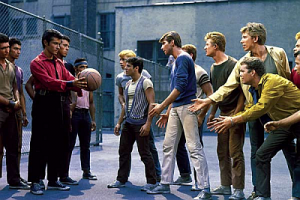East End Style.
It’s the sports equivalent of a gang fight. Two factions face off like the Bloods and the Crips—but instead of using automatic weapons they settle their differences on the basketball court. Sure it’s a little more civilized way of settling differences—but only a little. It’s still brutal, raw and puts everything on the line in a no-holds-barred free-for-all, where only one side emerges as a winner. Sometimes it’s in teams; sometimes a single player is selected by his “gang” to “represent” the entire gang in a game of one-on-one. It was the latter game that I found myself in the crosshairs of as my gang’s point person on a chilly, overcast morning back in the fall of 1971.
Some people say that high stakes gangland throw downs like this only happen in the inner-city, in the proverbial “West End.” Most the time that’s true. But not this time. The setting was the extreme East End at St Francis in the Fields elementary school, where I had just transferred for third grade and today was the first day of school. It was good to see my peeps again. I had been gone for a year—on hiatus. I had spent second grade at Sunnyland. No, that’s not what they called Juvee back then. It was a small private elementary school in Ft Lauderdale, FL where my family had moved the year before on business and I went with them. But my compadres at St Francis weren’t sure what had happened to me. Only that I had gone away for a while. And now I was back. And that’s all they needed to know.
The tension between third and fourth graders at St Francis in the Fields was palpable that first day of school—spilling over from last year’s unresolved tension between second and third graders, stemming mostly from tether ball disagreements.
 Like the Hatfield’s and McCoy’s famous feud, no one could remember the details. Only that a rivalry had developed that wasn’t going away until it was settled. And today was the day. And this was the place. The third grade boys were feeling especially emboldened this day with me back. I was known in second and third grade circles in those parts as a fairly accomplished basketball player.
Like the Hatfield’s and McCoy’s famous feud, no one could remember the details. Only that a rivalry had developed that wasn’t going away until it was settled. And today was the day. And this was the place. The third grade boys were feeling especially emboldened this day with me back. I was known in second and third grade circles in those parts as a fairly accomplished basketball player.
It soon became apparent to me that I was their ringer—and would represent my entire gang, or grade, as we settled our differences Old School. On the basketball court at recess after second period. The fourth grader’s choice of leader was not a choice at all. It was a forgone conclusion that no one dare question. His name was Allen Lavin. Allen was tall, athletic and handsome—and already good with the ladies (not afraid of cooties. In fact, fearless around the threat of cootie exposure.) I remembered him from a year earlier. I could easily picture him in my 8 year old East End mind one day playing in the NBA. I could imagine him dominating both on the court and then off the court wearing a full length mink coat while holding forth at the after party. He just had that charisma and cockiness of a natural leader who couldn’t fathom ever losing.
Allen Lavin was from a well-heeled horse breeding family in Oldham County. But don’t be fooled by his pedigree. Lavin was all about street ball—first and last—and everyone in the lower school knew he alone owned the basketball court when it was time for recess.
And then there was me. I was a bit of an enigma. A quiet but determined scrappy kid. Short but fast and with a bit of a chip on my shoulder that made me feel I had to prove something. I was the guy that could surprise you. And others felt it. I wasn’t like the Lavins. My family wasn’t part of the Establishment. We were more nouveau riche. Sure we could afford the private school tuition, but as they say on the East End streets, “We hadn’t gotten in country club yet.” And there were external signs of class differences too. I didn’t wear a belt. It wasn’t that we couldn’t afford belts…but rather I didn’t wear them because I had a mild sensory disorder that made some clothing articles, like belts, feel very uncomfortable to me. And then there was the other reason I kept to myself. I felt not wearing a belt gave me an advantage at sports. I wasn’t limited in my range or movement by a belt. There were aerodynamic reasons I chose not to wear a belt. And it made me lighter. And I knew I would need every advantage going up against Allen Lavin.
And so now was the moment of truth as we sized each other up. It wasn’t only about the gangs. Part of this was about families too. Lavin’s family were already long time members of the country club. So, yeah, it was personal also.
Allen warmed up with mid range jump shots and effortless lay ups. Finally someone threw me a ball to see if I had game. Everyone got quiet. Eerily quiet. I dribbled like it was something I did in my sleep and walked back 5 and then 10 feet away from where Lavin was shooting his jumpers. I scooped the ball, squatted down and launched from between my legs a 25 foot low-arching shot that almost went in. It was a shock to onlookers. Not the shot itself but my shooting form. Most kids develop the strength to shoot overhanded by age 6. But I had decided last year to stretch out my underhand game another year because my strength still wasn’t there and I could hone my current game. Fourth grade would be my transition year to move to overhand shooting. But for now it was a street savvy surprise underhanded shot that would make or break my grade.
My gang was OK with it. Some even seemed to like it. It threw Lavin off balance a little. He sniffed, “Don’t be bringing that weak underhanded shot in here Brown.” I said nothing. Which made him wonder what I knew that he didn’t. While some of the fourth graders continued laughing at my latent shooting form and feeling they had the game in the bag, I noticed one of the wiser and worldly fourth graders, Luke Thornburgh, wasn’t laughing. He had seen more of the world than most of his fellow fourth graders and had probably been the victim before of underestimating a rival. Lavin made another cutting remark about me shooting like a “little girl.”
I zinged him back, “If you hadn’t noticed, Wilt Chamberlain and Rick Barry both shoot underhanded” much to the delight of my third grade posse. “Yeah, free throws. Not jump shots” Lavin retorted. “Maybe. But Chamberlain is the all time leading scorer in the NBA and Barry was the top free throw shooter in the league.” I shot back with vengence. No response. There was nothing to say.
It was game time according to Allen. I shot for the ball. A sweet underhanded free throw heaved with all I had in me. Nothing but net. My ball.
I don’t remember a lot after that except I did get a number of my shots blocked by Allen Lavin. When you shoot overhanded you can shoot over the head of the person guarding you. But if you are short and shoot underhanded you tend to shoot right into the knees of the person guarding you, making it easier for him to block your shots.
I do remember at some point feeling like I was probably going to lose. I remember, too, looking at the fourth graders cheering Allen on and wondering if they would like me more if I lost. I was about to find out, whether I wanted to or not. I gave it all I had but it wasn’t enough. It seems like the score was 20-14 or maybe 20-12. Whatever the score was, when we heard the teacher calling us in from recess, Allen Lavin was still the unquestioned King of the Basketball Jungle at St Francis in the Fields elementary school. He was congratulated by his gang, again. And I was consoled by mine. But Lavin saw something in me and figured I would be better off as an ally than an enemy. After that we became friends—even great friends.
Later that year my family got accepted to the country club. Whether my alliance with Allen Lavin played a part in that, I’ll never know.
Why am I telling this story now? Last night my daughter had one of her new best friends over to spend the night. Eleanor Lavin. Yeah, small world, huh? She came into my office for a couple of minutes to talk to me about her dad, Kevin, who also became a great friend, and her famous uncle Allen.
The two families, it seemed, were still friends –now into the second generation. I didn’t bother telling little Eleanor Lavin how our families came to meet—that we were briefly bitter rivals until her uncle punished me during the first day of 3rd grade recess on the basketball court. I figured children don’t need to know all their family history. Life for them is tough enough already. In time she may find out the ugly truth; or maybe she never will. And that’s just as well.
That’s all behind us now. For the most part. Sure, there was still a twitch in me after Eleanor left my office and I told her to say hi for me to her uncle Allen. The scars of that defeat are still there. And I couldn’t help but wonder what a second showdown—now—might look like between us. Maybe I would win this time. Maybe not. But I know this. There would be one very noticeable difference as we took the court, if there ever is a next time. I’ve have since learned to shoot overhanded.


















Leave a Reply